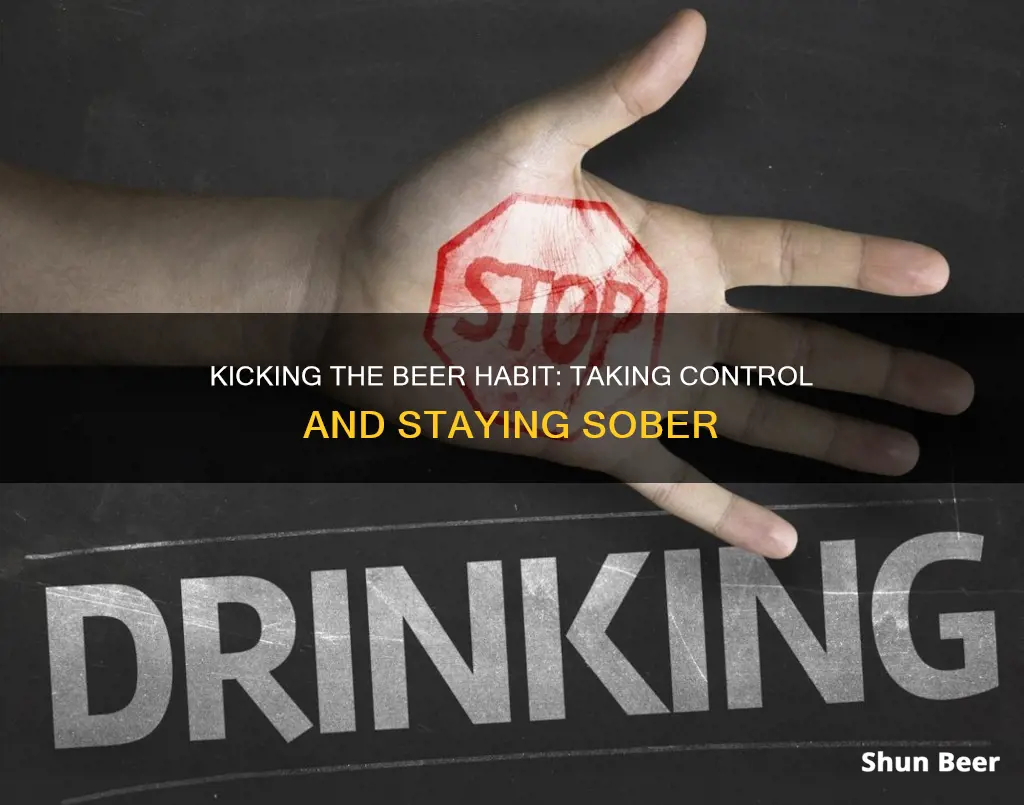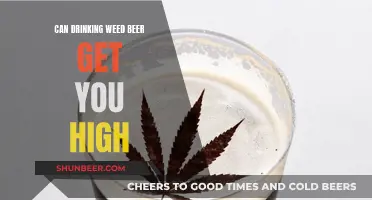
If you're looking to stop drinking beer on your own, it's important to first understand your relationship with drinking and the reasons behind your decision to quit. Recognising a drinking problem is the first step towards becoming alcohol-free. This may include examining the health effects of drinking, such as increased blood pressure, and identifying your triggers for drinking. It's also crucial to set clear and realistic goals, build a supportive environment, and develop healthy habits to replace your drinking habits. Practical tips include keeping a drinking diary, removing alcohol from your home, choosing alcohol-free days, and finding tasty non-alcoholic alternatives. Remember, quitting drinking can be a challenging journey, so be persistent and don't hesitate to seek professional help if needed.
| Characteristics | Values |
|---|---|
| Understand your relationship with drinking | Identify why you want to stop drinking and how much you drink |
| Seek social support | Tell trusted friends and family about your goal to stop drinking |
| Develop new routines | Find new hobbies and activities to fill the time you would usually spend drinking |
| Change your environment | Avoid places and people associated with drinking, remove alcohol from your home |
| Prepare for alcohol detox | Understand potential withdrawal symptoms and seek medical advice if concerned |
| Practice self-care | Eat well, exercise, prioritise sleep, find satisfying hobbies |
| Reach out for professional support | Discuss with your doctor or therapist, consider a support group |
What You'll Learn

Recognise your drinking problem
Recognising that you have a drinking problem is the first step towards becoming alcohol-free. Many people with drinking problems cannot tell when their drinking is out of control. You likely have a drinking problem when your body depends on alcohol to function and your drinking is causing problems with your health, social life, family, or job.
Talk with your health care provider about your drinking. Your provider can help you find the best treatment. If you feel you are dependent on alcohol, you should consult your doctor or another health professional. Being dependent on alcohol means you feel unable to function without it, and that stopping drinking causes physical withdrawal symptoms like shaking, sweating, or nausea.
If you are dependent on alcohol, it could be dangerous to stop drinking too quickly without proper support. Your doctor may be able to prescribe medication to help, or you can refer yourself to a specialist alcohol team for support. Your doctor may also be able to arrange or signpost you to counselling and psychological support, and you could access local support groups to help you stay on track.
To help you understand your drinking problem, you should take some time to explore your relationship with alcohol. Figure out how much you actually drink. Keep a diary of your drinking for three to four weeks, including information about what and how much you drank, as well as where you were. Compare this to the recommended guidelines: no more than one standard drink per day for women and men over 65, and no more than two standard drinks per day for men under 65. These limits may be too high for people with certain medical conditions or for some older adults.
If you are having trouble sticking to the recommended guidelines, discuss it with your doctor or another health professional.
Asking for Beer Outside Gas Stations: Does It Work?
You may want to see also

Understand your relationship with alcohol
Understanding your relationship with alcohol is a crucial step in giving up drinking. It is important to be honest with yourself and identify why you are giving up alcohol. This could be to improve your health, your relationships, or to save money. You might also want to consider if you are dependent on alcohol, and if so, consult a doctor or health professional.
Once you have identified your reasons for giving up, it is a good idea to make a list of these reasons and keep them somewhere visible, to remind yourself of your motivation. You could also try writing down the steps you will take to achieve your goal, such as setting a start date and telling your friends and family about your decision.
It is also important to identify your triggers. These could be certain people, places, or events that are tied to drinking. Being aware of these triggers can help you to avoid them or find alternative ways to cope. For example, if you usually drink after work on Fridays, you could organise to meet friends at the cinema instead.
You might also want to keep a diary of your drinking habits, including what and how much you drank, and where you were. This can help you to identify patterns and triggers, and also help you to stay on track with your goal.
Finally, it is important to be persistent. Changing habits takes time and work, and it is normal to have setbacks. Don't be discouraged if you slip up, just start again the next day and learn from your mistakes.
Beer and Type 2 Diabetes: What's the Verdict?
You may want to see also

Identify your triggers
Identifying your triggers is a crucial step in quitting drinking. Triggers can cause an overwhelming craving for alcohol and lead to relapse. However, by understanding and managing these triggers, you can reduce your risk of relapse and maintain sobriety. Here are some common types of triggers and strategies to manage them:
Perceived Opportunity Triggers
Perceived opportunity triggers occur when you sense an opportunity to relapse, often followed by intense cravings. This can include passing by a bar or bottle shop, or specific times and days associated with previous drinking habits, such as Friday evenings after work. To manage these triggers, it's helpful to have a plan. For example, consider taking a different route to avoid passing by a bar or bottle shop. If certain times or days are triggers, plan alternative activities during those periods, such as spending time with friends or attending a support group meeting.
Attention-Allocating Triggers
Attention-allocating triggers arise when you allocate too much mental energy or brainpower to thinking about your addiction, which can reduce self-control and increase the risk of relapse. For instance, constantly thinking about how much you miss drinking or focusing on negative aspects of your life can be attention-allocating triggers. To manage these triggers, practice mindfulness and redirect your thoughts towards positive activities or hobbies that bring you joy. Engaging in such activities can help shift your attention away from your addiction.
Stress Triggers
Daily stress is a significant trigger for many individuals in recovery. Stress-related triggers can impair concentration and judgment, leading to impulsive decisions and poor choices. For example, if you have a stressful job, you may be more likely to crave alcohol as a coping mechanism. To manage stress triggers, it's essential to practice stress-management techniques such as exercise, meditation, or deep breathing. Additionally, seeking professional help, such as counselling or therapy, can provide you with effective strategies to cope with stress in a healthy manner.
Priming Triggers
Priming triggers occur when an individual, often after a period of sobriety, mistakenly believes they can control their drinking. This usually happens after six to eight months of sobriety, leading to an attempt at occasional drinking, which reactivates the addiction pathway. To manage priming triggers, it's crucial to recognise that addiction is a chronic disease, and even a single drink can lead to a full-blown relapse. Understanding that sobriety is a lifelong commitment is essential for managing these triggers.
Internal Triggers
Internal triggers are related to your emotions and the way you feel. For example, drinking alcohol can change the balance of chemicals in your brain, affecting your mood positively or negatively. Some people drink in anticipation of these effects, while others drink to cope with negative feelings. However, it's important to remember that alcohol is a depressant, and even if it provides temporary relief, it won't help in the long run.
External Triggers
External triggers are related to your physical environment, the culture of the place you live, and your interactions with others. Examples include a lack of non-alcoholic beverage options, being alone or eating alone, other people offering you alcohol, passing by a bar, social situations such as parties or restaurants, the sight or smell of alcoholic drinks, and particular foods associated with alcohol.
Habit and Routine Triggers
Habit and routine triggers are also common and can include specific times, such as Fridays or the end of the workday, after an argument, celebrating something, having an open bottle of alcohol, or meeting with certain family members or friends.
Passover Beer: What Jews Can Drink and Avoid
You may want to see also

Make a plan
Making a plan is a crucial step in achieving your goal of stopping drinking beer. Here are some detailed instructions and suggestions to help you create an effective plan:
Understand your relationship with alcohol:
Start by examining your drinking habits and patterns. Identify your triggers, such as specific people, places, or emotions that make you want to drink. Recognise the reasons behind your decision to stop drinking, whether it's for health, relationships, or any other personal factor. Understanding your relationship with alcohol will help you tailor your plan accordingly.
Set clear and achievable goals:
Define your drinking goal by deciding whether you want to cut back or quit completely. If you choose to reduce your intake, set a daily or weekly limit that is realistic and in line with medical recommendations. You can gradually decrease your consumption over time if necessary. Consider setting short-term goals, such as an alcohol-free week or month, to help you stay motivated and track your progress.
Create a supportive environment:
Remove alcohol from your immediate environment, including your home and workplace. Inform your friends and family about your goal, as their support and encouragement can be invaluable. Consider joining support groups or surrounding yourself with other non-drinkers who can relate to your journey. Avoid places and situations that trigger your urge to drink, especially during the initial stages of your plan.
Develop alternative coping strategies:
Identify healthier ways to manage stress, anxiety, or other emotions that may have previously led you to drink. This could include practising self-care, such as regular exercise, meditation, or engaging in hobbies and activities that bring you joy. Find alternative beverages that you enjoy and make them your go-to drinks when you feel the urge to drink beer.
Prepare for challenges and setbacks:
Accept that there may be challenges and setbacks along the way, and plan how you will handle them. Have a list of distractions or activities to turn to when cravings arise. If you find yourself in a situation where you are offered a drink, practise saying "No, thank you" in advance, and have a polite but firm response ready if people inquire further. Remember that setbacks are normal and don't define your long-term success.
Seek professional help if needed:
If you feel you may have an alcohol use disorder or experience physical withdrawal symptoms when you stop drinking, consult your doctor or a healthcare professional. They can provide guidance, support, and referrals to specialised programmes or support groups if necessary.
Remember, your plan should be tailored to your specific needs and circumstances. Be patient with yourself, celebrate your successes, and don't be afraid to adjust your plan as you navigate this journey.
Beer and Kidney Stones: Is It Safe to Drink?
You may want to see also

Seek support
Seeking support is a crucial aspect of successfully stopping drinking beer on your own. Here are some detailed tips to help you seek support and navigate your journey towards sobriety:
Inform your support network:
Let your trusted friends and family members know about your decision to quit drinking. They can provide encouragement, hold you accountable, and help you stay motivated. Informing them of your decision also helps them understand your new habits and encourages them to support your sobriety.
Find a support buddy:
Consider asking a trusted friend or family member to be your support buddy. This person can accompany you to events where alcohol is present, making it easier to decline drinks. They can also be your go-to person when you feel triggered or experience cravings. Having someone to talk to and hold you accountable can make a significant difference in your journey.
Join support groups:
Support groups, such as Alcoholics Anonymous (AA) or SMART Recovery, can provide valuable guidance and a sense of community. These groups offer a safe space to discuss your experiences, learn from others, and gain tools to maintain sobriety. Many people in these groups have gone through similar struggles, and their insights can be incredibly beneficial.
Seek professional help:
If you feel comfortable, discuss your decision and challenges with your primary healthcare provider or a therapist. They can offer personalised advice and refer you to appropriate support programs or counselling services. It's important to remember that seeking professional help is a sign of strength and can significantly increase your chances of success.
Connect with sober communities:
Consider joining sober communities or online support groups to find like-minded individuals who can relate to your experiences. These connections can provide ongoing encouragement and a sense of belonging as you navigate your alcohol-free journey.
Be persistent:
Remember that relapses or setbacks are common and don't define your overall success. Most people who achieve long-term sobriety often do so after several attempts. Be kind to yourself, learn from your mistakes, and keep moving forward. Persistence and commitment to your goal are essential.
Remember, seeking support is a courageous step towards improving your health and well-being. You don't have to go through this journey alone, and by reaching out for help, you increase your chances of achieving lasting sobriety.
Drinking Beer in Your Front Yard: Legal or Not?
You may want to see also
Frequently asked questions
Recognising that you have a drinking problem is the first step towards being alcohol-free. If you feel that you're drinking too much or too often, it's always wise to check with your doctor. They can help you decide whether it is best for you to cut back or abstain.
With less alcohol in your system, you're likely to experience benefits such as clearer skin, better sleep, and an overall boost in your mood. You may also lose weight and lower your blood pressure.
Identify your triggers (situations or places where you're tempted to drink) and avoid them. If that's not possible, admit your desire to drink and don't judge yourself for it. Call or text a friend and remind yourself why you've stopped drinking.
Tell your family and friends that you're aiming to stop drinking alcohol and explain why. This way, you can share your successes with them, and they'll understand why you've started turning down drinks. Avoid situations where you may be tempted to drink, such as the weekly pub quiz or restaurants that serve alcohol.
Know how you'll say "no thank you" ahead of time. You can simply say, "I'm cutting back for my health" or "I don't like the way drinking makes me feel." It can also be helpful to practice your refusal ahead of time.







